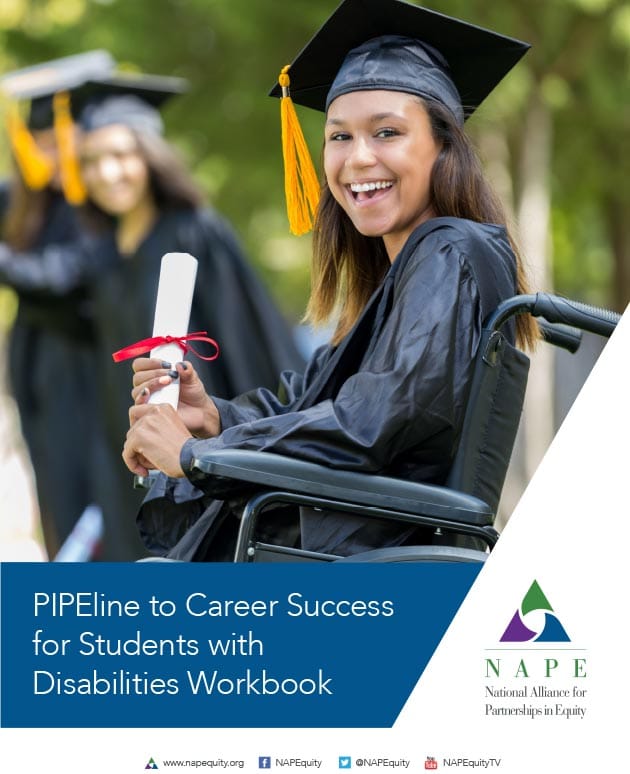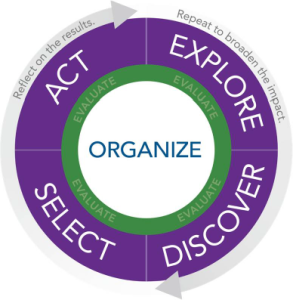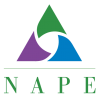 We are encouraged by the results of PIPEline to Career Success for Students with Disabilities (PIPEline), a collaboration between the National Alliance for Partnerships in Equity (NAPE) and a group of state agencies in Delaware to close the opportunity gap for students with disabilities (SWD) in CTE.
We are encouraged by the results of PIPEline to Career Success for Students with Disabilities (PIPEline), a collaboration between the National Alliance for Partnerships in Equity (NAPE) and a group of state agencies in Delaware to close the opportunity gap for students with disabilities (SWD) in CTE.
SWD are more likely than their peers without disabilities to experience significant barriers to postsecondary education and training, as well as competitive employment. In addition, SWD tend to have less access to rigorous academic programming, as well as career and technical education (CTE) pathway opportunities in middle and high school. Further, these students tend to experience higher dropout rates and lower graduation rates, significantly minimizing their options for successful long-range careers. The impacts of these disparities are far-reaching: many SWD are left economically dependent on others and unable to fully participate as contributing members of the communities in which they live.
PIPEline to Career Success for Students with Disabilities (PIPEline) collaboration includes: The Delaware Department of Education’s CTE and STEM Workgroup and the Exceptional Children Workgroup; Delaware Department of Labor’s Division of Vocational Rehabilitation and Division of Developmental Disabilities Services; Delaware Health and Social Services’ Division for the Visually Impaired. These state agencies are collaborating to support school districts to implement NAPE’s Program Improvement Process for Equity (PIPE). PIPE engages teams of educators, community members, and other stakeholders to: use data to conduct a performance and participation gap analysis; learn about the research literature on root causes for these gaps; conduct action research to identify the root causes in play at their institution; select and implement an aligned intervention that directly addresses the identified root causes; and evaluate their success. This iterative process has been applied to the context of SWD to increase the enrollment, matriculation, graduation, and transition to postsecondary education and competitive employment of SWD through CTE career pathways.
Beginning in 2018-19, the collaboration funded the first pilot cohort of three school districts: Appoquinimink School District, Capital School District, and Laurel School District. Currently just starting their third year of implementing PIPE the teams are seeing transformations in the climate, systems and supports for SWD. Examples of outcomes include: Appoquinimink School District increased the percentage of students with disabilities participating in work-based learning from 0% to 7.9%. Capital School District increased the enrollment of students with disabilities in early childhood education program from 10% to 20% and in Natural Resources and Environmental Sciences from 15% to 18%. Laurel School District, a small rural district in Delaware, found that students with IEP’s were not enrolled in CTE and those that were enrolled were not in programs aligned with their career goals. In the first year of implementation the special education staff and counseling staff collaborated to manually register students into their aligned pathway increasing the enrollment of special education students from 72 to 139 students in culinary, finance, plant science, teacher academy and biomedical sciences.
PIPEline has five Delaware school districts in 2020-21 participating in virtual professional development implementing PIPE. The challenges presented by the pandemic and virtual learning have been especially apparent for SWD. These five school districts are meeting every two weeks to continue to understand the equity gaps they are uncovering, explore root causes, share effective strategies, and support one another. They are committed to ensuring that students with disabilities don’t experience the COVID slide and that they continue to be successful in CTE.
 This data-driven professional development and technical assistance program engages teams in long-term and sustainable improvement processes addressing the root causes of outcome gaps in career pathways for students with disabilities. Cross-functional teams will research, analyze, and be equipped with the knowledge and tools to support a continuous improvement using NAPE’s 5-step cycle: Organize, Explore, Discover, Select, Act. Participants will align strategies, implement solutions, and evaluate outcomes through peer-to-peer collaboration and evaluation to foster learning environments that promote an increase in the number of students with disabilities who:
This data-driven professional development and technical assistance program engages teams in long-term and sustainable improvement processes addressing the root causes of outcome gaps in career pathways for students with disabilities. Cross-functional teams will research, analyze, and be equipped with the knowledge and tools to support a continuous improvement using NAPE’s 5-step cycle: Organize, Explore, Discover, Select, Act. Participants will align strategies, implement solutions, and evaluate outcomes through peer-to-peer collaboration and evaluation to foster learning environments that promote an increase in the number of students with disabilities who:
 We are encouraged by the results of PIPEline to Career Success for Students with Disabilities (PIPEline), a collaboration between the National Alliance for Partnerships in Equity (NAPE) and a group of state agencies in Delaware to close the opportunity gap for students with disabilities (SWD) in CTE.
We are encouraged by the results of PIPEline to Career Success for Students with Disabilities (PIPEline), a collaboration between the National Alliance for Partnerships in Equity (NAPE) and a group of state agencies in Delaware to close the opportunity gap for students with disabilities (SWD) in CTE.